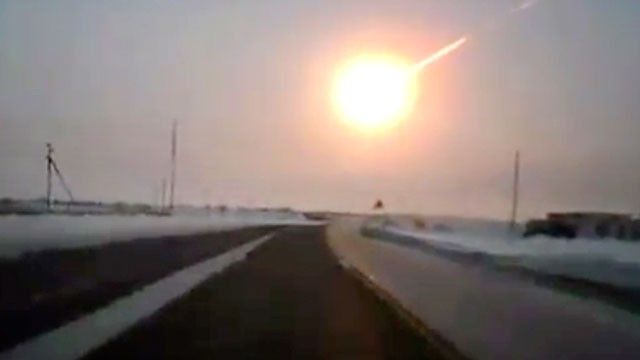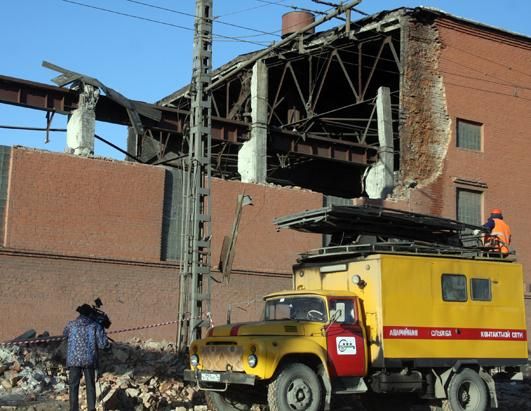 In this frame grab made from a video done with a dashboard camera, on a highway from Kostanai, Kazakhstan, to Chelyabinsk region, Russia, Feb. 15, 2013 a meteorite contrail is seen.More than 1,200 people were injured when a massive meteor broke apart above the Russian city of Chelyabinsk today, raining burning bits of rock over the city that shattered windows and caused a panic.
In this frame grab made from a video done with a dashboard camera, on a highway from Kostanai, Kazakhstan, to Chelyabinsk region, Russia, Feb. 15, 2013 a meteorite contrail is seen.More than 1,200 people were injured when a massive meteor broke apart above the Russian city of Chelyabinsk today, raining burning bits of rock over the city that shattered windows and caused a panic.
The injured includes at least 204 children. Early figures indicated that 30 adults and 13 children were taken to hospitals, authorities told the Russian news agency Interfax. Two were reported to be in serious condition.
Witnesses said they thought a war had broken out.
Dashboard cameras captured a blinding flash of light streaking across the sky. The streaking meteor fragments triggered sonic booms and their impact set off car alarms and exploded windows. The wall of a zinc factory collapsed.
 A circular hole in the ice of Chebarkul Lake where a meteor reportedly struck the lake near Chelyabinsk, about 930 miles east of Moscow, Russia, Friday, Feb. 15, 2013. Photo: Chelyabinsk Regional Branch of Russian Interior Ministry (AP)"I saw a body moving in the skies. In a moment there came a flash - we first thought it was fireworks but a moment later we saw a trace as if from the rocket followed by an explosion in a couple of minutes. The window broke ... tea, bread, water - everything fell on the floor," one restaurant waiter in Chelyabinsk said.
A circular hole in the ice of Chebarkul Lake where a meteor reportedly struck the lake near Chelyabinsk, about 930 miles east of Moscow, Russia, Friday, Feb. 15, 2013. Photo: Chelyabinsk Regional Branch of Russian Interior Ministry (AP)"I saw a body moving in the skies. In a moment there came a flash - we first thought it was fireworks but a moment later we saw a trace as if from the rocket followed by an explosion in a couple of minutes. The window broke ... tea, bread, water - everything fell on the floor," one restaurant waiter in Chelyabinsk said.
One scientist told Russian television the meteor was a big one, weighing perhaps tens of tons, but stressed that it was not related to the asteroid that is expected to buzz close to Earth later today.
NASA scientists in the U.S. also confirmed that the meteor was not related to asteroid DA14, a building-sized space rock, expected to pass Earth at a distance of 17,000 miles but not strike.
Regional officials said the one large fragment fell in a lake, but debris had been reported in three parts of Russia and in Kazakhstan.
Schools in the region closed for the day after most of the windows were blown out, citing freezing temperatures, which were below zero degrees Fahrenheit during the day.
 A local zinc plant was badly damaged by a shockwave from a meteorite impact (blast force equaled to 300-400 kilotons) that landed in Chelyabinsk, Russia, Feb. 15, 2013. (ITAR-TASS)Debris from the meteor was found in three sites around the country, but emergency services say ground zero was Chebarkul Lake, just west of Chelyabinsk.
A local zinc plant was badly damaged by a shockwave from a meteorite impact (blast force equaled to 300-400 kilotons) that landed in Chelyabinsk, Russia, Feb. 15, 2013. (ITAR-TASS)Debris from the meteor was found in three sites around the country, but emergency services say ground zero was Chebarkul Lake, just west of Chelyabinsk.
The meteor knocked out cell phone networks, but electricity and water supplies were not affected. Rosatom said all its nuclear power facilities were functioning normally.
 В Атырау -10
В Атырау -10